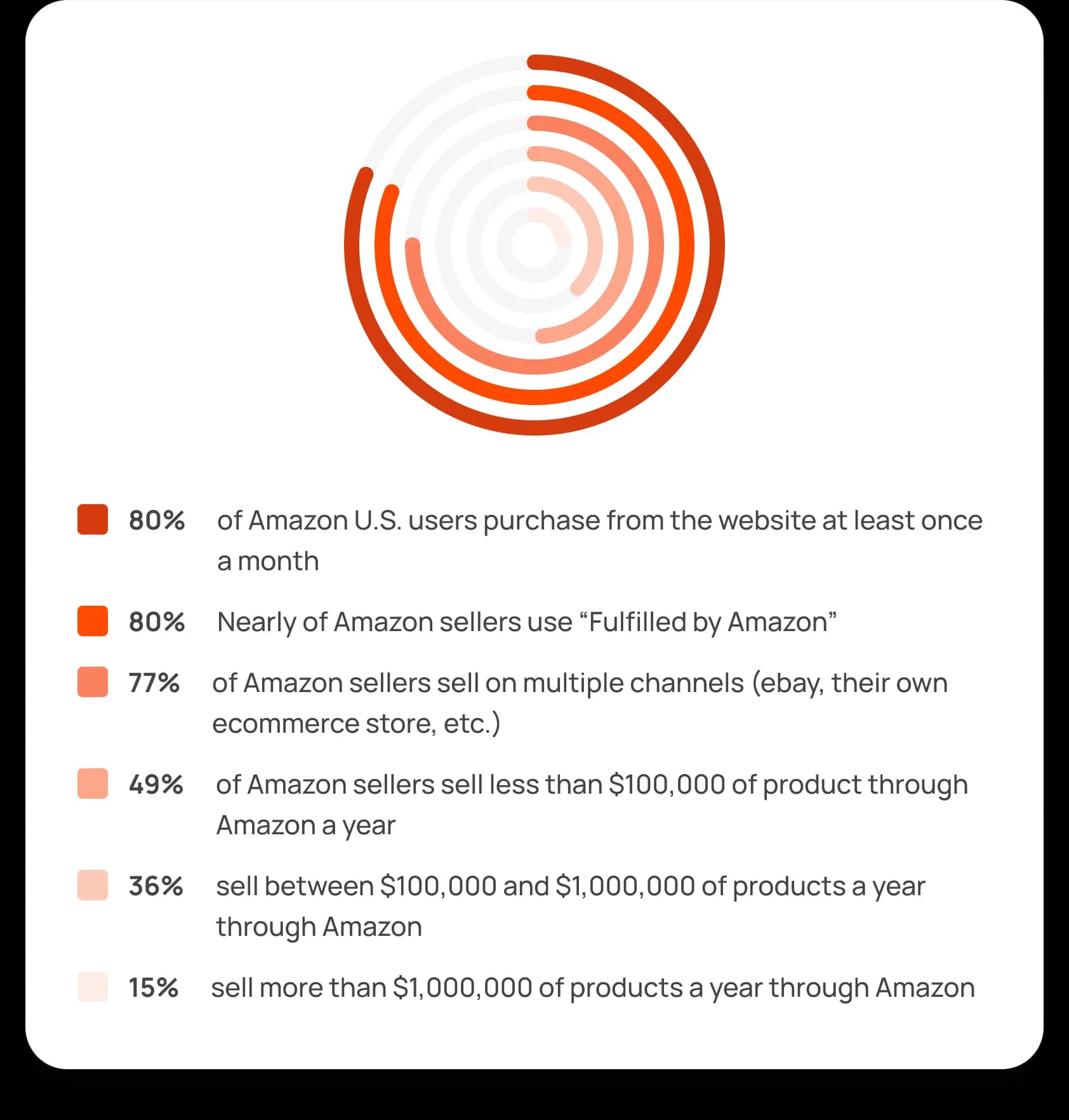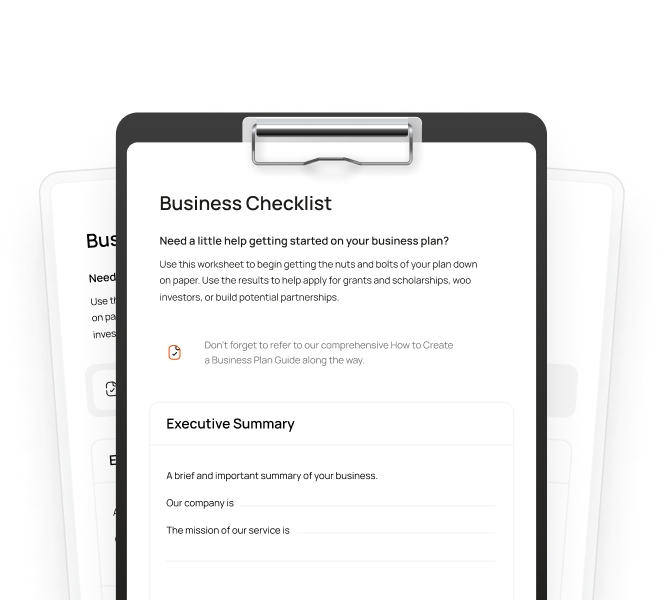

Join 1,000,000+ Entrepreneurs like you
Entrepreneurship is booming – and we're happy to be one of America's fastest growing companies.

On this page
Amazon Business
It’s a lucrative space, and there’s money to be made. If you want to get into the world of ecommerce and selling online, you have a few choices.
If you’re a traditional, “brick and mortar” store, you can start up an ecommerce website
You could build your own ecommerce store from scratch
You can take advantage of marketplaces on existing ecommerce websites such as Amazon and Etsy
Of course, the dominant player in the ecommerce space is Amazon - it’s among the world’s largest ecommerce websites, and it provides some massive opportunities for sellers. As an Amazon business, you can offer your products for sale through Amazon to gain access to their enormous reach, technology and marketplace.
You might think selling on Amazon is easy; they do a good job of setting up sellers for success. Despite this, there are potential pitfalls to selling on Amazon, so we’ve put together this complete guide to tell you exactly how to maximize your chances of creating a thriving Amazon business. We’ll cover:
Understanding the world of Amazon businesses and what it takes to be an Amazon seller
The various rules and regulations you will need to follow
Questions you should ask to see if you’re ready to start an Amazon business
Hiring employees, marketing and administration
The best legal structure for your new organization
Information on taxes and finances for your Amazon business
Resources for your Amazon business
.. and much more
By the time you’ve read through our complete Amazon business guide, you will have all the information you need to setup and manage a thriving Amazon business. Let’s get into it.
Understanding the World of the Amazon Business
So, what exactly is an Amazon seller? Simply put, they are people and companies who source goods and then sell them on Amazon at a profit. There are two main kinds of Amazon businesses:
"Sold by Amazon" Sellers
Sellers who source, procure, store and ship the goods themselves including taking care of customer service and returns. They only use Amazon to list their products, get exposure, sell them and take payment. These are known as "Sold by Amazon” sellers.
Amazon FBA Sellers
Sellers who source and procure products themselves but then send them to an Amazon warehouse for storage, sale, payment and shipping. Amazon handles all customer service and returns. These are known as “Fulfilled by Amazon (FBA)” sellers
The difference is that in FBA, Amazon takes care of storing, shipping, customer service and returns. Of course, Amazon does charge for these services, and “Sold by Amazon” is less expensive than “Fulfilled by Amazon.” But if you’re just a “Sold by Amazon” seller, you will have to take care of your own logistics, customer service and storage, which can be costly. As a result, nearly 80% of Amazon sellers use the “Fulfilled By Amazon” service for some or all of their products.
Typically, Amazon sellers source products from large supplier marketplaces like Alibaba, Salehoo, Wholesale Central and more.
$136B
Amazon.com's revenue in 2016
300M
Number of people shops on Amazon.com
100K
Amazon sellers had sales of $100K or more in 2016

Understand Your Amazon Business Market
If you want to be successful on Amazon, finding the right products and buyers is absolutely essential. Due to the success of the platform, there is a vast amount of competition across almost every niche and product. The biggest factors that will decide your success are choosing the right product, understanding the demand for that product and selling it at a profit.
What Your Amazon Business Customers Are Looking For
People who buy on Amazon are motivated to purchase in a few different ways:
Price
Amazon is famously known for its competitive prices, so much so that people often compare prices in traditional stores with what Amazon is charging. You need to keenly price your items.
Speed
Customers want their items quickly. If you’re using FBA, Amazon will take care of that for you. If you’re shipping out yourself, you will need to have fast and reliable logistics and distribution.
Quality
Customers expect high-quality items that do what you say they will. Even if items are inexpensive, customers do not expect the quality to be “cheap.”
Reviews
Reviews are the lifeblood of ranking your products on the marketplace. Good reviews are essential for getting your products seen and creating trust with other buyers.
Is This Business For You?
Is Amazon Business Entrepreneurship For You?
Although Amazon does resolve many of the issues facing an e-commerce startup (marketing, acquiring sales, managing distribution, etc.), that doesn't make running an Amazon business easy. You must be able to deal with significant competition, be acutely aware of the state of the marketplace, deal with Amazon’s regulations and policies and be a master administrator.
The profit margins are also likely to be razor-thin. You need to create, buy inventory, manage and maintain a successful business on small profit margins and against a very competitive landscape. But, if you can make it, the upsides are huge. If your product really gets traction, you could make your way into the upper ranks of sellers who make more than $1,000,000 a year on the platform.
What Are the Main Skills, Expertise and Experience to Be a Successful Amazon Entrepreneur?
Being a successful Amazon business owner requires a diverse set of skills:
Strong research abilities
So you can find the right suppliers, products and customers
Excellent forecasting abilities
So you can understand trends in the market and ensure you have enough stock and inventory
Great flexibility
So you can adapt to changing requirements and customer needs
Good math skills
So you can work out profit margins, cash flow and foreign currency exchange
Powerful attention to detail
So you can examine top sellers, product specifications and supplier requirements
Good marketing skills
Since often basics such as headline writing, copywriting and call-to-actions can make or break your Amazon listing
What Are the Main Challenges for an Amazon Seller Entrepreneur?
Here are the main issues an Amazon seller entrepreneur is likely to face:
Running a Successful Business With Thin Profit Margins
The Amazon seller space is very competitive. A combination of price pressure, foreign exchange rates and customer expectations means you need to take care of all your business costs from constantly pressurized profit margins. It’s essential to have a deep understanding of the numbers so you can pay all your business costs from those margins.
Cash Flow and Inventory Management
Because of these thin profit margins you have to judge cash flow very carefully and balance your cash on hand versus money you have coming in and having enough inventory to meet customer demand. You will also need to bear in mind lead times on getting products from your suppliers and build this into your seasonal demand cycles.
Dealing with Competition
Competition is ever-present in the Amazon selling space. You need to keep a constant eye on other sellers, look at their product offering and prices. You will need to tweak your stock levels and selling prices so you rank properly.
Marketing and Promotion
Although you will get exposure on Amazon’s marketplace, you also need to market yourself. That could be via buying ads on Amazon itself, social media marketing, going through an affiliate or some other means. The right mix of marketing will make a big difference to your success.
What Does a Day in the Life of a Amazon Seller Entrepreneur Look Like?
Here’s what you can expect in an average day:
Reviewing sales from the previous day, week and month to see what products are doing well
Reviewing sales from the previous day, week and month to see what products are doing well
Making orders with your suppliers and arranging for payment
Exploring new opportunities for products and expanding into a different marketplace
Calculating profit margins and selling prices to ensure you can pay all your business expenses
Dealing with any requests or issues flagged by Amazon
...and much more
Check out our additional guidance in understanding if an Amazon business is the right choice for you. If this blog post, we'll help you analyze if your Amazon business idea is a good one, conduct market research and build a business plan.
Choose the Right Business Structure and Register Your Amazon Business
Now that you have all the background information for your Amazon seller business, it’s time to make it into a reality. That starts by choosing the right structure or “legal entity” for your business. In the U.S., there are four main business structures. They are:
- Sole Proprietorship
Micro business owners who don’t want to form a legal entity, like an LLC, can be sole proprietors. Why not keep operations simple, right? Sole proprietors pay tax on business income when they pay their personal taxes. However, suppose a sole proprietor doesn’t have a separate business account. In that case, juggling business and personal taxes can be tricky, and they might miss out on certain tax deductions if not fully aware. What’s the catch? Doing business as a sole proprietorship leaves owners unprotected in a way that forming a legal entity doesn’t. Entities, like LLCs or S Corps, give owners more protection for personal assets so they aren’t jeopardized during financial hardship or litigation.
- Limited Liability Company or LLC
LLC taxes are typically very simple and flexible for micro business owners. There’s a reason why more than 80 percent of small business owners choose an LLC when forming their business. LLCs are “pass-through” entities, meaning profits are “passed through” as income to owners or members, and business owners get to report LLC income on their personal tax returns. As far as asset protection, LLCs offer a hybrid structure that allows owners more control over their business and extra protection for personal assets in case of financial or legal issues because company assets are owned by the LLC and are separate from the owner’s personal assets.
- S Corporation
Filing as an S Corporation could save micro business owners money. Meaning, like an LLC or sole proprietorship, profits pass through to shareholders, and income is taxed on the shareholders’ personal tax returns. This means the corporation’s profits are only taxed once, and shareholders avoid double taxation. S Corps also offer owners certain legal protections for personal assets, which are separate from the business’s assets. Shareholders aren’t personally liable for the company’s debts or liabilities, and creditors can’t go after the shareholders’ personal assets to recover business debts.
- C Corporation
If a micro business is a C Corporation, the company pays C Corp tax rates on qualifying corporate profits. Then, post-tax income can be distributed to corporation shareholders as dividends. Shareholders are taxed on dividends, so owners pay taxes on the same earnings twice—once at the corporate level and then at an individual level. This is called “double taxation.” Since a C Corp is a separate legal entity, the business’s liabilities are separate from the liabilities of the directors, investors, and shareholders.
For more information on the advantages and disadvantages of different types of businesses, please see our in-depth guide. If you've still got questions, we've answered them to help you choose the right business structure.
In most cases our recommendation would be to create an LLC, We've got a complete guide to everything you need to do and we can set one up for your Amazon Seller business. LLC formation dose vary from state to state, but we've got you covered, wherever you are.

Setup & Maintain Your Amazon Business
Once you've legally created your Amazon business you’ll need to get some other things in place.
Business Location
Where are you going to run your business? Will you work from home, get an office, use a shared working space or something else? In most cases, unless you are planning to store products, it’s best to start an Amazon business from your home.
Permits & Licenses
Running an Amazon business could come with certain rules, regulations and legalities you need to be aware of. Bizee can conduct a Business License Research package for you, or you can take the time to do the research yourself.
Finances and Taxes
What kind of bank account will you get? And how will you pay your business taxes? How do you find the best business credit card? These are all important things to consider, so your Amazon business stays in the green. Check out our quick guide to finances and taxes for Amazon sellers.
Processes
What business processes are you going to use to run your business efficiently and effectively? You will need efficient processes for managing inventory, dealing with suppliers, ordering stock, looking at competitors and completing market research.
Equipment
What equipment do you need to manage your Amazon business? Make sure you understand exactly what you need to spend, so you can write it off against business expenses. In most cases, you won’t need any specialized equipment or supplies unless you are planning to ship products yourself.
Business Maintenance
Most states require businesses to file an Annual Report report once a year. You will also be expected to pay estimated taxes on what you plan to earn in the current business year. And, your federal, state, regional and city business licenses and permits may need to be renewed on a regular basis, typically once a year.
Employees
Do you need to hire employees to help you out? This may change as your business grows, but try to think ahead about what sort of experts you may need.
Software
Is there software that can help you manage and market your business? There are dozens of software applications designed specifically to help Amazon sellers. Here are some great starting points.

The Complete "Start Your Business" Checklist
A Clear and Comprehensive Guide to Starting Your Business the Right Way
Social Media Groups for Your Amazon Business
Connecting with other business owners in your industry can be incredibly helpful. Here are some of the best social media groups:
Discussion Groups and Forums for Amazon Entrepreneurs
There are plenty of forums and online discussion groups for Amazon businesses. Start with these:
Of course, there are also regular conferences for Amazon seller businesses:
Of course, there are also regular conferences for Amazon seller businesses:
Hustle Helpers Useful
Tools to Get You Started
There is a vast amount of tech tools, apps and services available to business owners to help them market and manage their business. But for side hustlers, you’re looking for something that’s quick to adopt, without a steep learning curve.
Collaboration
Social Media Management
Communication
Email Marketing
Advertising
Customer Relationship Management (CRM)
Customer Support
Human Resources
Website Development
Analytics
Hiring
Please note: This post contains affiliate links and we may receive a commission if you make a purchase using these links.
Conclusion
Starting an Amazon business can be both very challenging and very rewarding. Find the right niche, source great products and sell them at a profit and you have the makings of a successful business. Eventually, you could be among the 15 percent who sell more than $1,000,000 worth of products every year.









